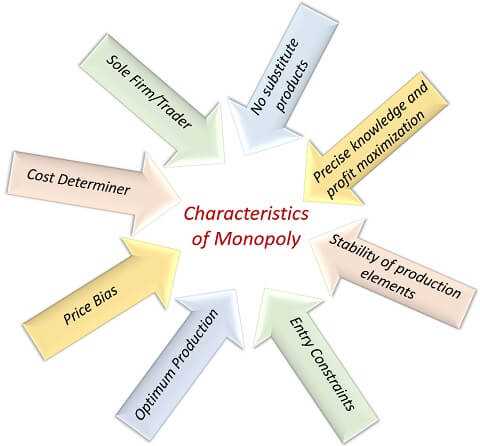A monopoly is a market structure in which a single seller controls the entire supply of a good or service. This gives the monopolist a great deal of market power, and they can therefore charge higher prices and restrict output.
There are a number of characteristics that define a monopoly. These include:
- Single seller: There is only one seller in the market. This means that the monopolist has no competition, and they can therefore set the price of the good or service.

- No close substitutes: There are no close substitutes for the good or service that the monopolist sells. This means that consumers have no choice but to buy from the monopolist, even if they are unhappy with the price or the quality of the product.
- Barriers to entry: There are significant barriers to entry into the market. This means that it is difficult or impossible for new firms to enter the market and compete with the monopolist.
The major characteristic of a monopoly is market power. Market power is the ability of a firm to influence the price of a good or service. In a competitive market, firms have very little market power, as they are price takers. This means that they must accept the market price for their goods or services. However, in a monopoly, the firm has complete market power, and they can therefore set the price of the good or service.
The market power of a monopoly allows them to charge higher prices than would be possible in a competitive market. This is because consumers have no choice but to buy from the monopolist, even if they are unhappy with the price. The monopolist can also restrict output, which can lead to higher prices and lower consumer surplus.
Monopolies can have a number of negative consequences for the economy. These include:
- Higher prices: Monopolies can charge higher prices than would be possible in a competitive market. This can lead to a decrease in consumer surplus, as consumers are forced to pay more for goods and services.
- Reduced output: Monopolies can restrict output, which can lead to a decrease in the availability of goods and services. This can also lead to higher prices, as the monopolist is able to charge more for a scarce good or service.
- Inefficiency: Monopolies can be inefficient, as they have no incentive to innovate or improve their products. This can lead to a decrease in the quality of goods and services, and it can also lead to higher prices.
Monopolies can also have a negative impact on economic growth. This is because they can stifle innovation and competition, which are essential for economic growth.
There are a number of ways to regulate monopolies. These include:
- Antitrust laws: Antitrust laws are designed to prevent monopolies from forming and to break up existing monopolies.
- Regulation: Governments can regulate monopolies by setting price controls or by requiring them to provide certain services.
- Public ownership: Governments can also own and operate monopolies. This is often done in the case of natural monopolies, such as utilities.
The best way to regulate monopolies depends on the specific circumstances. However, it is important to take steps to prevent monopolies from forming and to ensure that they do not have a negative impact on the economy.